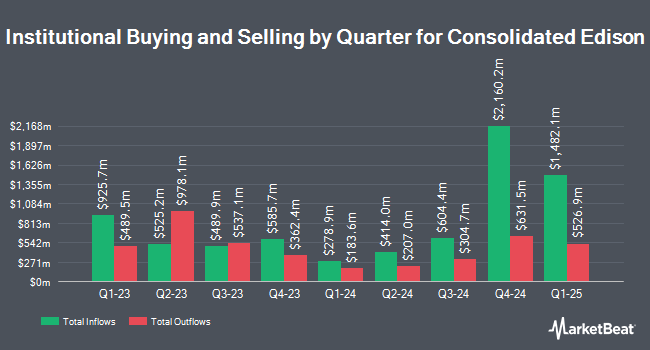Kettle Hill Capital Management LLC lessened its position in Consolidated Edison Inc (NYSE:ED - Free Report) by 50.0% in the first quarter, according to the company in its most recent 13F filing with the Securities and Exchange Commission (SEC). The firm owned 102,495 shares of the utilities provider's stock after selling 102,317 shares during the period. Consolidated Edison comprises about 3.1% of Kettle Hill Capital Management LLC's portfolio, making the stock its 14th largest holding. Kettle Hill Capital Management LLC's holdings in Consolidated Edison were worth $11,335,000 at the end of the most recent reporting period.
A number of other hedge funds also recently modified their holdings of the stock. Revolve Wealth Partners LLC raised its stake in Consolidated Edison by 13.4% in the 4th quarter. Revolve Wealth Partners LLC now owns 3,721 shares of the utilities provider's stock worth $332,000 after purchasing an additional 441 shares in the last quarter. Aptus Capital Advisors LLC raised its stake in Consolidated Edison by 10.0% in the 4th quarter. Aptus Capital Advisors LLC now owns 6,134 shares of the utilities provider's stock worth $547,000 after purchasing an additional 556 shares in the last quarter. Ameriprise Financial Inc. raised its stake in Consolidated Edison by 1.7% in the 4th quarter. Ameriprise Financial Inc. now owns 198,994 shares of the utilities provider's stock worth $17,767,000 after purchasing an additional 3,275 shares in the last quarter. Cary Street Partners Financial LLC acquired a new stake in Consolidated Edison in the 4th quarter worth about $1,585,000. Finally, Captrust Financial Advisors raised its stake in Consolidated Edison by 5.2% in the 4th quarter. Captrust Financial Advisors now owns 40,255 shares of the utilities provider's stock worth $3,592,000 after purchasing an additional 1,995 shares in the last quarter. Institutional investors and hedge funds own 66.29% of the company's stock.
Consolidated Edison Stock Up 0.4%
Shares of Consolidated Edison stock traded up $0.35 during trading on Tuesday, reaching $97.00. 1,282,092 shares of the company traded hands, compared to its average volume of 2,754,276. The company has a debt-to-equity ratio of 1.04, a current ratio of 1.10 and a quick ratio of 1.01. Consolidated Edison Inc has a 1-year low of $87.28 and a 1-year high of $114.87. The company has a 50 day moving average price of $101.15 and a 200-day moving average price of $104.01. The firm has a market capitalization of $34.98 billion, a PE ratio of 17.60, a P/E/G ratio of 2.72 and a beta of 0.28.
Consolidated Edison (NYSE:ED - Get Free Report) last released its earnings results on Thursday, August 7th. The utilities provider reported $0.67 earnings per share (EPS) for the quarter, beating analysts' consensus estimates of $0.66 by $0.01. Consolidated Edison had a net margin of 11.98% and a return on equity of 8.56%. The company had revenue of $3.60 billion for the quarter, compared to the consensus estimate of $3.39 billion. During the same quarter in the previous year, the company earned $0.59 EPS. Consolidated Edison has set its FY 2025 guidance at 5.500-5.700 EPS. As a group, equities research analysts expect that Consolidated Edison Inc will post 5.62 earnings per share for the current fiscal year.
Consolidated Edison Announces Dividend
The firm also recently disclosed a quarterly dividend, which will be paid on Monday, September 15th. Shareholders of record on Wednesday, August 13th will be issued a dividend of $0.85 per share. The ex-dividend date is Wednesday, August 13th. This represents a $3.40 annualized dividend and a yield of 3.5%. Consolidated Edison's dividend payout ratio is presently 61.71%.
Wall Street Analyst Weigh In
ED has been the subject of several analyst reports. Bank of America cut shares of Consolidated Edison from a "buy" rating to an "underperform" rating and dropped their price objective for the stock from $112.00 to $101.00 in a research note on Friday, August 15th. KeyCorp reiterated an "overweight" rating on shares of Consolidated Edison in a research note on Wednesday, July 16th. Barclays raised their target price on shares of Consolidated Edison from $101.00 to $107.00 and gave the company an "underweight" rating in a report on Wednesday, August 13th. Morgan Stanley reissued an "underweight" rating on shares of Consolidated Edison in a report on Thursday, August 21st. Finally, Scotiabank raised their target price on shares of Consolidated Edison from $101.00 to $106.00 and gave the company a "sector perform" rating in a report on Monday, August 11th. Three equities research analysts have rated the stock with a Buy rating, six have issued a Hold rating and three have assigned a Sell rating to the company. According to MarketBeat.com, the company currently has an average rating of "Hold" and an average target price of $105.82.
Get Our Latest Stock Report on ED
Consolidated Edison Company Profile
(
Free Report)
Consolidated Edison, Inc, through its subsidiaries, engages in the regulated electric, gas, and steam delivery businesses in the United States. It offers electric services to approximately 3.7 million customers in New York City and Westchester County; gas to approximately 1.1 million customers in Manhattan, the Bronx, parts of Queens, and Westchester County; and steam to approximately 1,530 customers in parts of Manhattan.
Recommended Stories

Before you consider Consolidated Edison, you'll want to hear this.
MarketBeat keeps track of Wall Street's top-rated and best performing research analysts and the stocks they recommend to their clients on a daily basis. MarketBeat has identified the five stocks that top analysts are quietly whispering to their clients to buy now before the broader market catches on... and Consolidated Edison wasn't on the list.
While Consolidated Edison currently has a Hold rating among analysts, top-rated analysts believe these five stocks are better buys.
View The Five Stocks Here
Discover the 10 Best High-Yield Dividend Stocks for 2025 and secure reliable income in uncertain markets. Download the report now to identify top dividend payers and avoid common yield traps.
Get This Free Report
Like this article? Share it with a colleague.
Link copied to clipboard.